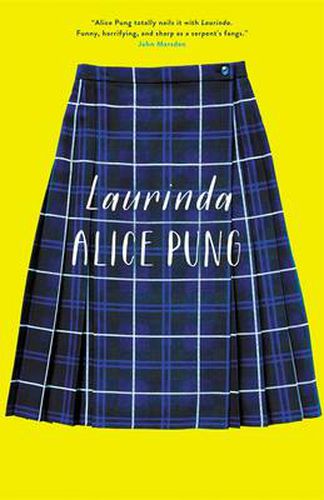Alice Pung on writing fiction for young adults
We’re loving Alice Pung’s new young adult novel, Laurinda! Here she tells us what she sees as the challenges and freedoms of writing fiction for young adults as opposed to adults.
No other books have moved me or shaped me as much as the books I read as a teenager, when I had time to think about the world and my place in it. Young adulthood is a time when, for the very first time, you have the thoughts, ideas and feelings of your adult self and yet you’re still relatively powerless and lacking in life experience. The authors that spoke true to me – John Marsden, Sonya Hartnett, Robert Cormier, Paul Zindel – understood this.
Growing up in Braybrook, we could understand a world where teenagers had experienced war. Some of my mates came as unaccompanied minors from the Vietnam war, many of us were working, some were caretakers for sick adults, and at the very least, we translated the world for them because they couldn’t read or write. In all senses except legally, we felt like adults. So we appreciated fiction that treated subjects like war, mental illness and depressed socio-economic circumstances not as edgy ‘themes’ but realities that kids were facing stoically everyday with all the internal fortitude they could muster. My friends from Braybrook were hilarious, brave, insightful and mischievous: not generally the traits that pop up when you read most YA books about kids from that kind of background.
That’s why, when writing Laurinda, I was not concerned with capturing a teenager’s ‘voice’. YA is still my favourite genre and when I read a book that fails or doesn’t ring true, it’s because the author is trying too hard to sound the way a teenager speaks. But if you hear teenagers talk, sometimes they sound quite vacuous and inarticulate, their sentences peppered with ‘likes’. This belies the fact that their thoughts are infinitely more complicated.
So I was more concerned with capturing Lucy’s thoughts. I wanted to create a character that was funny, feisty, and insightful but not precocious. The best thing about writing in a teenager’s thoughts is that they’re not filtered. I could say a lot about class and educational inequality in a satirical way through the voice of Lucy; whereas if she were an adult character, people automatically become defensive. The private school debate in the media has been quite two-dimensional, shrill and uninteresting, reduced to clichés and exaggerations. In the end, it has to go back to the student’s experience: I wanted to portray what it was like, day by day, for an outsider girl to be privy to such privilege.
There had been a suggestion, early in editing, that I change my cultural references from the 1990s to present day so kids could ‘relate’ more. I refused to do this, because I no longer have an idea of what’s ‘cool’ (if I ever did). Young adults don’t care about setting so much. The biggest challenge - and freedom - is that teenagers are the most discerning readers. They can pick out a false note from a mile away. What they care about is character and plot. Teenagers – so lacking in action in their own lives – want some action! Not necessarily sex or violence, but just the sense that the author has taken their problems and issues as seriously as adult issues and problems.
Bullies exist at every stage of life, and I wanted to portray this in a way that was nuanced and multi-layered, allegorical to the adult world. After all, I called the reigning triangle of girls at Laurinda ‘the Cabinet’! Politics permeates all areas of life, and no group is more aware of this than teenagers.



